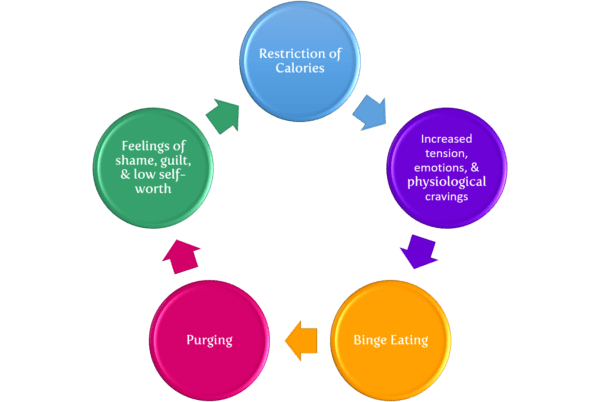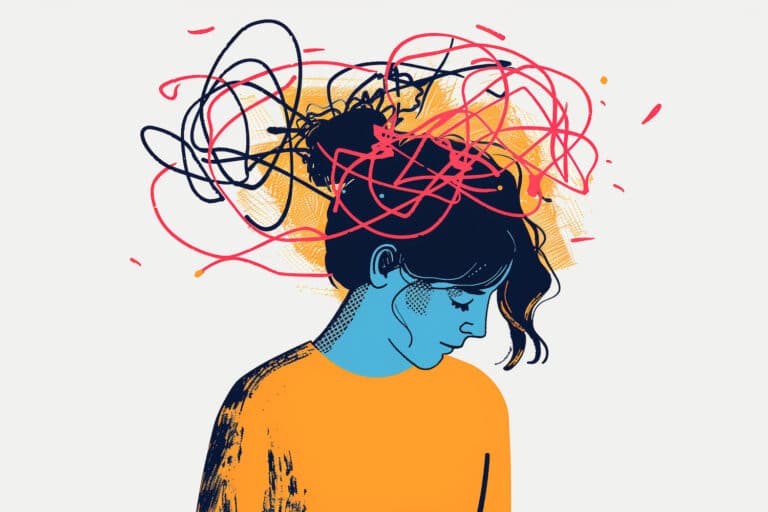The binge-purge cycle of bulimia nervosa consists of behaviors, thoughts, & emotions. It is a cycle of intense shame for those struggling and can be a source of confusion for loved ones as to why the individual doesn’t “just stop.” The cycle is repetitive, and individuals suffering from bulimia will often find it impossible to stop. Before we look at the binge-purge cycle, let’s talk about bulimia nervosa.
Bulimia nervosa is a severe mental health disorder that is characterized by a cycle of bingeing followed by recurrent compensatory behaviors (self-induced vomiting, misuse of laxatives, diuretics, or other medications, fasting, or excessive exercise) to rid the body of unwanted calories. The constant cycle of bingeing and purging can take a drastic toll on the digestive system and lead to electrolyte and chemical imbalances in the body, affecting the heart and other organ functions. Unlike individuals with anorexia, those with bulimia do not typically appear to be underweight, making it difficult to detect since it is not physically obvious.
The Binge-Purge Cycle
Over time, the cycle frequency tends to increase, and this pattern becomes more firmly ingrained in the brain. However, no matter the frequency or length of time someone has engaged in this pattern, it is possible to step out of it.
What interventions are used to help break this cycle?
- Decide not to restrict food or calories. People struggling with bulimia frequently wish to continue restricting calories by just cutting out the binge/purge components, making this one of the most difficult decisions to alter the cycle. However, to break the cycle, there must be a willingness to let go of calorie restriction and restricting types of food, which can lead to feelings of deprivation. Normalizing eating patterns is essential to freedom, and a dietitian can help guide in ways to do this.
- Practice mindfulness. Bingeing and purging are methods to avoid internal experiences. Practicing mindfulness helps you process what is happening in your body and thoughts rather than trying to stop or change them. There are many mindfulness practices, but we encourage urge surfing, which is centered on the notion that our urges and intimate experiences are ever changing and thus time-limited. Urges are like a wave with a peak of intensity and then a gradual decline. However, when we are at the center of an urge, the thought that this will ever be different tends to go out the window. In urge surfing, we encourage our clients to notice what the urge or craving feels like in the body and to stay with it, noticing how the urge and the intensity change over time. Staying with the urge allows for a reach to the other side and decreased intensity.
- Develop a plan for when urges to binge or purge hit. There are likely several things someone would rather do than bingeing or purging. However, in the heat of the moment, tunnel vision sets in, and the focus narrows to just bingeing and purging. Making a list of 5 to 10 things to do other than engaging in the behavior can be a helpful reminder when the urge hits.
- Agree to delay binge eating or purging. An intense urge can be overwhelming and feel everlasting. Delaying the engagement in the behavior by five minutes can make the process seem less overwhelming. At the end of five minutes, a commitment to another five minutes may be possible, and perhaps the next time may be a delay of 20 minutes. Regardless of the time, simply creating that space for a postponement allows a different decision to be made rather than acting on autopilot.
- Write a letter to yourself. Writing a letter to yourself about why you don’t want to engage in the binge/purge cycle can be a helpful reminder. Think about writing a letter to your struggling self during strong urges. What would you need to hear? What would be helpful at that time? Often letters are comprised of validation for how difficult the current experience is, a reminder of life goals and how this behavior interferes with achieving them, and encouragement to take other specific actions instead. Keeping your letter close is encouraged as it can be a powerful tool in the throes of urges.
- Make a list of positive affirmations. Listing positive self-statements for each stage of the cycle is another idea. What affirmations are needed to refrain from restricting, to stop from binging or purging, or to cope with the shame that comes from this behavior? The key is to write statements that are at least somewhat believable. They do not need to feel like absolute truth, but should not feel totally out of the question.
- Identify the thoughts that typically precipitate a binge or purge. Many people will say they have no thoughts before a binge or purge; they engage in the behavior. However, later, the contributing factors are identified. They may say things such as, “Well, I already had one, so I might as well have the whole box,” or “If I don’t get rid of this, I am going to gain weight.” Identifying these thoughts and then countering them with something more truthful can be helpful. Try this tip: Draw a line lengthwise down the middle of a piece of paper. On one side of the line, write typical thoughts; on the other side, write ways to reframe these thoughts to more recovery-oriented ones. Writing this out allows for a different perspective than the one contributing to using behaviors.
- Identify and address the most vulnerable times during the day. Often, a daily pattern develops for when the binge/purge behavior occurs. For many people, times of heightened vulnerability are the transition to home from work/school, or late in the evening. Developing a schedule for what to do during these times of vulnerability can help in practicing the skill of coping ahead and lessen the likelihood of engaging in behaviors.
- Practice healthy self-care. When we look at the cycle, feelings of increased tension and emotions can contribute to a binge. There are aspects of self-care that can lessen our vulnerability to these triggers. Identifying simple changes may increase the quality of self-care and decrease vulnerability to engaging in behaviors. The following are some ways to assess self-care:
- Exploring how much sleep you are getting.
- What are you doing to cope with stress?
- What are you doing for enjoyment?
- Is there a healthy work/life balance?
- Are you treating any physical illnesses?
- Are you staying connected to others?
- Enlist social support. One of the most helpful tools is simply letting others into your world. While extremely challenging, picking up the phone to call a friend or loved one and speaking out loud that you have an urge to binge or purge can be extremely helpful.
This list is not exhaustive, but it is just a few ways to start breaking the cycle. When working to break the cycle, we highly encourage you to seek the support of a treatment team. In the beginning, it may feel like your urges are lasting for hours at a time, and you may doubt your ability to do this. The more you can refrain from engaging in the cycle, the more manageable the urges will become. A treatment team can provide the extra support and guidance to break this cycle and live the life of freedom that you want.
The Magnolia Creek Difference
While bulimia can be potentially life-threatening, it is treatable. At Magnolia Creek, we offer evidence-based therapies that can help to break the binge-purge cycle. Our team of professional dietitians customizes a meal plan to meet each client’s weight restoration needs. We meet the needs of the whole person by treating not only the eating disorder but also the mental, physical, spiritual, and emotional needs of each woman in our care. We instill a sense of hope and empowerment by partnering with our clients and encouraging them to participate actively in their treatment. The therapeutic environment of Magnolia Creek is designed to support each client as they explore the contributing factors of their bulimia or other eating disorder and challenge the thoughts and behaviors that prevent them from living their life freely.
If you or a loved one is struggling with an eating disorder or co-occurring mental health condition, we encourage you to complete our contact form. We are here to provide support and premier treatment that helps clients learn that recovery is possible.




